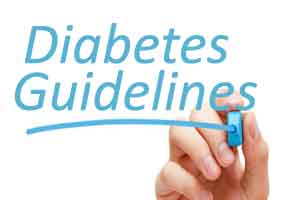- Home
- Editorial
- News
- Practice Guidelines
- Anesthesiology Guidelines
- Cancer Guidelines
- Cardiac Sciences Guidelines
- Critical Care Guidelines
- Dentistry Guidelines
- Dermatology Guidelines
- Diabetes and Endo Guidelines
- Diagnostics Guidelines
- ENT Guidelines
- Featured Practice Guidelines
- Gastroenterology Guidelines
- Geriatrics Guidelines
- Medicine Guidelines
- Nephrology Guidelines
- Neurosciences Guidelines
- Obs and Gynae Guidelines
- Ophthalmology Guidelines
- Orthopaedics Guidelines
- Paediatrics Guidelines
- Psychiatry Guidelines
- Pulmonology Guidelines
- Radiology Guidelines
- Surgery Guidelines
- Urology Guidelines
2019 Updated guideline on management of hyperglycemia: ADA and EASD

The American Diabetes Association (ADA) and the European Association for the Study of Diabetes (EASD) have released an updated version of their 2018 recommendations on the management of hyperglycemia (high blood sugar levels) with glucose-lowering medications. This was based on the important research findings from large cardiovascular outcomes trials published in 2019. The recommendations are published in the journal Diabetes Care.
"The field of diabetes care is rapidly changing as new research, technology, and treatments that can improve the health and well-being of people with diabetes continue to emerge," wrote John B. Buse, Department of Medicine, University of North Carolina School of Medicine, Chapel Hill, NC, and colleagues.
Read Also: Hyperglycemia Management in T2 Diabetes: ADA 2018 Consensus Report
Key recommendations include:
- In certain high-risk people with diabetes, clinicians' decision to use a glucagon-like peptide 1 (GLP-1) receptor agonist or sodium–glucose cotransporter 2 (SGLT2) inhibitor to reduce cardiovascular and renal risk should be made without regard to baseline HbA1c or HbA1c target.
- For patients with established atherosclerotic cardiovascular disease and diabetes for whom major adverse cardiovascular events are the largest threat, GLP-1 receptor agonists have the greatest benefit against CV events. This class can also be considered for patients with diabetes who don't have established CVD but are at high risk.
- For patients with heart failure with reduced ejection fraction or chronic kidney disease (CKD), SGLT2 inhibitors are the most beneficial option. For patients with diabetes and CKD, this class is recommended to prevent the progression of CKD, heart failure hospitalization, major adverse cardiovascular events, and cardiovascular death.
- SGLT2 inhibitors are also recommended for people with foot ulcers and those at risk for foot amputation, but only after shared decision making about risks and benefits.
"2019 Update to: Management of Hyperglycemia in Type 2 Diabetes, 2018. A Consensus Report by the American Diabetes Association (ADA) and the European Association for the Study of Diabetes (EASD)," is published in the journal Diabetes Care.

Disclaimer: This site is primarily intended for healthcare professionals. Any content/information on this website does not replace the advice of medical and/or health professionals and should not be construed as medical/diagnostic advice/endorsement or prescription. Use of this site is subject to our terms of use, privacy policy, advertisement policy. © 2020 Minerva Medical Treatment Pvt Ltd